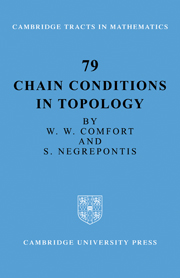Book contents
- Frontmatter
- Contents
- Introduction
- ERRATA
- Acknowledgements
- 1 Some infinitary combinatorics
- 2 Introducing the chain conditions
- 3 Chain conditions in products
- 4 Classes of calibres, using Σ-products
- 5 Calibres of compact spaces
- 6 Strictly positive measures
- 7 Between property (K) and the countable chain condition
- 8 Classes of compact-calibres, using spaces of ultrafilters
- 9 Pseudo-compactness numbers: examples
- 10 Continuous functions on product spaces
- Appendix: preliminaries
- References
- Subject index
- Index of symbols
Introduction
Published online by Cambridge University Press: 05 November 2011
- Frontmatter
- Contents
- Introduction
- ERRATA
- Acknowledgements
- 1 Some infinitary combinatorics
- 2 Introducing the chain conditions
- 3 Chain conditions in products
- 4 Classes of calibres, using Σ-products
- 5 Calibres of compact spaces
- 6 Strictly positive measures
- 7 Between property (K) and the countable chain condition
- 8 Classes of compact-calibres, using spaces of ultrafilters
- 9 Pseudo-compactness numbers: examples
- 10 Continuous functions on product spaces
- Appendix: preliminaries
- References
- Subject index
- Index of symbols
Summary
Our monograph passed through several stages before acquiring its present form. It began, several years ago, as material gathered for our earlier work on ultrafilters but eventually discarded as too peripheral to the principal subject. Lying inert for some time, and slowly gaining some unity, it appeared later in our minds as a systematization of existing applications of the Erdős–Rado principle on quasi-disjoint sets to topological situations (mainly, in product spaces). Finally, though, through the contributions of researchers such as Gaifman, Laver, Galvin, Hajnal, Kunen, Argyros, Tsarpalias, and Shelah, it became something more fascinating and delightful: a study of the fine structure of the (countable) chain condition; and, a study of topological spaces (and also of partially ordered sets, and of Boolean algebras, and even of Banach spaces) as a function of their Souslin number.
The tools for the most part are the classical, yet constantly developing and inexhaustibly fertile, principles of infinitary combinatorics (given in Chapter 1). Early in the development of topology, especially in the Moscow School of Alexandroff and Urysohn, in the work of Lusin and Souslin, in the Polish School, and in the work of Hausdorff, informal set-theoretic and infinitary combinatorial considerations were prominent. The subsequent systematic development of infinitary combinatorics by the Hungarian School, led by Erdős, based on Dedekind's box (pigeonhole) principle and inspired by Ramsey's theorem, provided concrete techniques through which topological questions could be examined.
- Type
- Chapter
- Information
- Chain Conditions in Topology , pp. vii - xiPublisher: Cambridge University PressPrint publication year: 1982



